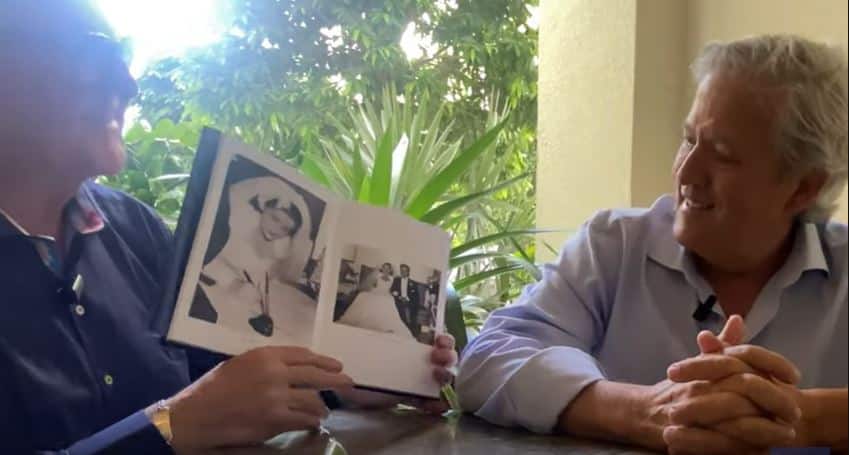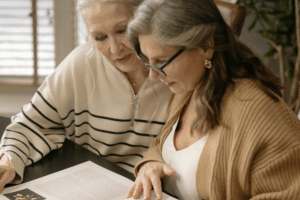In April 2024, our co-founder Roy Moëd traveled to Florida to meet a few of our authors and their families. Among them, Angel Alvarez, son of LifeBook author Esperanza, sat down to share his experience of working with us to create his mother’s private autobiography. It was a joy for Roy to celebrate Hope with him and to hear how much the preservation of Esperanza’s extraordinary legacy means to her family.
Looking back on life; looking forward to storytelling
From the outset, Angel was understandably keen to record his family’s history. Esperanza was 96 when her project got underway, and Angel had lost his father 20 years before, so he was eager to document his mother’s life.
At first, Esperanza was humble and modest. She felt shy about sharing her story. With the support of Angel, his siblings, and her grandchildren, however, Esperanza gradually eased into her interviews and came to enjoy telling her stories. Her local interviewer, who was also a Cuban American woman, added to Esperanza’s growing comfort and helped her share her memories. As the project continued, Angel reported that his mother and the family began to look forward to the interviews together.
While Esperanza did not initially feel that her story was an extraordinary one, it could not be in doubt that her life has been one of adversity and adventure. Born in Havana to a Spanish father and Cuban mother, Esperanza was the second of three daughters. When she was nine years old, her father decided to move the family to the U.S., temporarily, so that his daughters could learn to speak English fluently and improve their future job prospects for when they returned to Cuba. This plan certainly succeeded. During World War II, Esperanza found a job with an organization that rationed tires and gas. As the only person there who spoke English, she translated all of the communications that came in from the American embassy.
Toward the end of the war, Esperanza met and subsequently married Angel “Cuty” Alvarez, shortly thereafter delivering their first daughter.
In the 1950s, the Cuban Revolution erupted and reshaped the nation’s future. As with many Cuban families, this proved disastrous for the Alvarez family. Consequently, when invited to a meeting with Fidel Castro, the leader of the revolution, Cuty instead traveled to the airport and flew to Miami, leaving Esperanza to resolve matters at home. (Among her actions, she built a hidden wall inside the family home to safeguard their valuables.) She and their four children joined Cuty in the States a few months later, and, soon after arriving, Esperanza found that she was pregnant with her fifth child.
Settling in America was by no means easy, and, at times, it was difficult for the family to adjust to their new life, with fewer luxuries and significantly less comfort than they were used to in Cuba. Esperanza was a pillar of strength, however, and she and Cuty worked hard to restore their fortunes and to provide for their family. She threw herself into work, community, and philanthropy.
Esperanza and Cuty always hoped to return to Cuba one day to live in the home they had built there, but Cuty never felt safe enough to do so while Castro remained in power. He was, therefore, never able to see their home country again, but the family did take a trip to Cuba with Esperanza once travel restrictions finally eased in 2010. It was an emotional trip for the family, to say the least, and for Esperanza, it was a form of closure.
Stunning and unique
This, then, was the life that Esperanza set out to relive through her LifeBook interviews, but part way through the project, she sadly suffered a stroke. From that moment onwards, her children took the lead in concluding her autobiography. Each contributed a chapter containing their memories of their mother and their experiences as a family, primarily in relation to that seismic event that had shaped the Alvarez family story—leaving Cuba.
The result is a stunningly unique book. A rare and deeply emotional historical record, Esperanza’s grandchildren and great-grandchildren can now explore their family’s history through the eyes of different ancestors, side by side. For them, the chance to understand how Esperanza and her children view their extraordinary experiences is truly special. Their reflections are moving and often amusing, and they perhaps reflect a much wider Cuban American experience that is now, crucially, recorded for future generations of the family.
At the close of each chapter of Hope, each of Esperanza’s children reflects on what they have learned from their mother and how she has inspired them. Their reflections end in a beautiful tribute and a resonant closing line:
Continuing joy
Our co-founders’ shared intention for LifeBook Memoirs was always to provide a valuable storytelling experience as well as beautiful private autobiographies. It was, therefore, a great joy to hear that this particular autobiography is a gift that continues to bring joy to the Alvarez family. Angel says that his family members often read chapters from the book to the now 99-year-old Esperanza, and they reminisce together about their family history, occasionally gleaning an extra detail from her to add to their records.
Hope is not merely a private autobiography; it is a testament to a strong, determined, and deeply loved woman. Esperanza’s legacy has now been preserved for future generations, and we at LifeBook Memoirs are honored to have helped such a remarkable family to accomplish this.
Watch the video below to hear Angel discuss his and his mother’s LifeBook Memoirs experience in his own words:
Written by Isabella Samuels, LifeBook Memoirs editor




